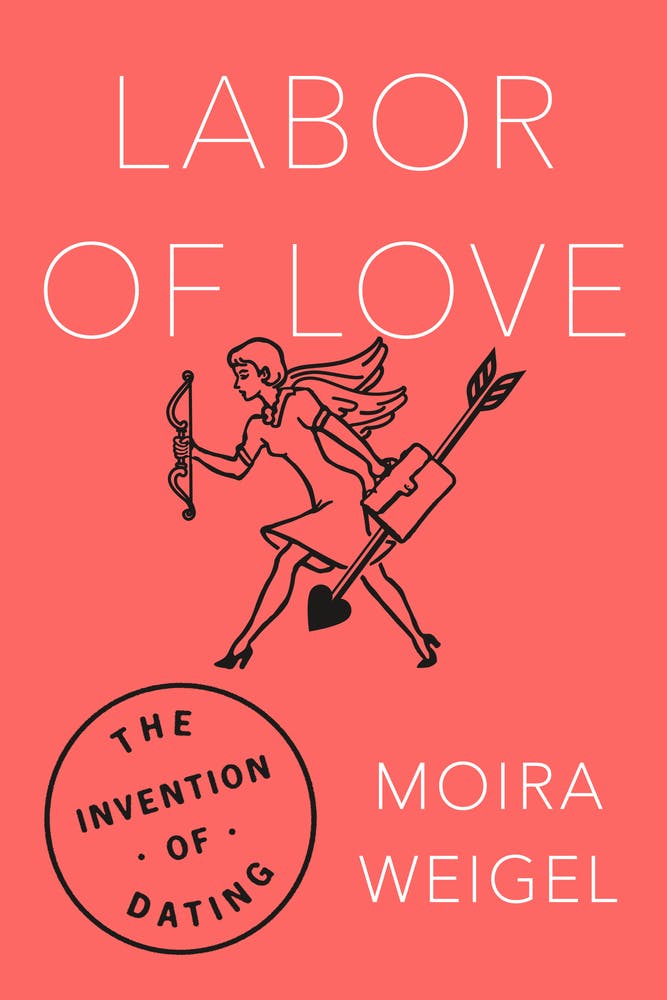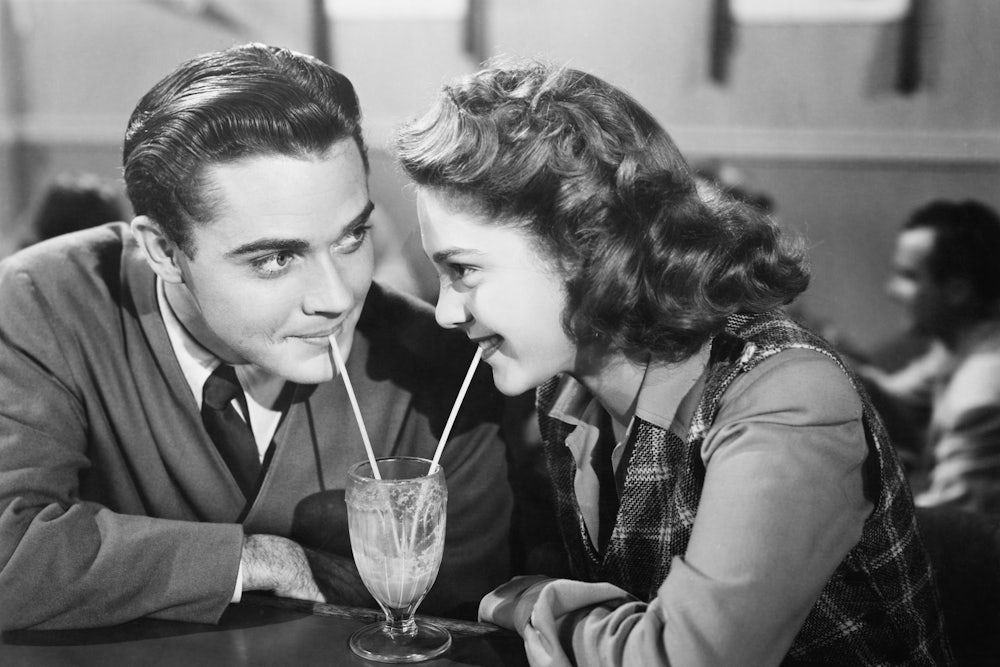Labor of Love begins with its then 26-year-old author, Moira Weigel, walking the High Line with an older man who is breaking her heart. She adores him, and he adores her attention, as well as that of his ex-girlfriend. He seems content to keep both of them around for as long as they’ll tolerate the arrangement. “What should I want?” Weigel asks him. He replies, “Doesn’t everyone just want to be happy?”

Dating, she realizes, is how she has learned to look for happiness. And the work of dating—an unending self-optimization ritual, a power struggle with stacked odds—has clouded her own desires. “As grown-ups, most of my friends agreed that dating felt like experimental theater,” she writes. “You and a partner showed up every night with different, conflicting scripts.”
So Weigel dove into the research that would become this quixotic 270-page history of dating, an activity most readers have intense feelings about, but scarcely know how to define. “Dating” is the practice of romance, but often it’s barely romantic at all. The desired outcomes of dating, as well as its customs, change by demographic and era. While not exclusively, Weigel ties her focus to one group: mostly straight, largely white, middle- to upper-middle class, college-educated, dwelling in American cities. This is the Archie Comic demo, whose reality, she acknowledges, is just one among others.
Dating, Weigel writes, was invented around the nineteenth century, when girls and women began heading to American cities from small towns and farms, and as well as from Italy and Eastern Europe. In bourgeois families, “calling” had been the custom: A young man showed up, presented his card to the servant, and waited to sit with the eligible daughter. The working class met and dated in public, in streets and dance halls and restaurants, and a young woman might depend on a young man earning double her wages for a night out or a meal. Shop girls learned to commodify themselves in pursuit of a better life, consuming to be consumed (and hopefully, married) by their wealthy clients. As the twentieth century progressed, with growing rates of high school and college attendance for both women and men, a lower-stakes culture developed, in which dates did not always need to lead to marriage and instead became currency—the most fun way to bolster your social value.
The metaphors of dating, Weigel writes, have often derived from the marketplace: “picking up,” “treating,” “damaged goods,” “buy the cow.” (And since the beginning, of course, dating has been a bum deal for women: financial and sexual freedoms, extended more generously to some women than others, expanded their possibilities while also expanding male dominance.) Dating trends are linked to economic ones. It is no coincidence, she suggests, that the rise of serial monogamy in the 1940s and 1950s coincided with the rise of consumer culture, and “dynamic obsolescence” in marketing. Similarly, the rise of niche marketing in the 1970s and 1980s mirrored the growth of “assortative mating,” as Americans increasingly married within their own income and educational brackets. Americans work harder now, in a more precarious labor market: 30 percent of the workforce is contingent, and the economy is largely service-based. The job market prioritizes emotional savvy, and applies pressure to remain thoroughly, constantly, and publicly employable—trends that match the rise of “hook-up culture.” “In an age where very few Americans make a living making anything,” Weigel writes, “dating trains us for our careers, and vice versa.”
I’ve read and reread Labor of Love, admiring Weigel’s organization and readability: She has managed to write a substantial book about dating for a popular audience, in the hope that, by understanding historical patterns, we’ll better understand our own tendencies. The lesson is smooth, but the effect is alienating. The book tells us about how people have dated and why, with reference to social forces, but it skirts the deeper whys of happiness and desire; it seems to confirm the author’s, and my, anxiety that dating has little to do with people. The difference between a transaction and an interaction is one of disposition—in this economy, one has to learn to toggle back and forth—so why mire ourselves in the sort of reasoning that flattens human motives to sheer self-interest?
My reservations about the book had less to do with the book’s argument than the fact that I fail to connect with Weigel’s sensibility. And because these universals—of love and fulfillment—are so personal, it felt jarring to be caught in her logic. Dating for anyone involves a measure of cold appraisal, bullshit, and exchange; it carries the risk of rejection, unrequited affection, sexual humiliation, shame about oneself or one’s body and its functioning, and worse. But dating is also a joy, and the real work of dating, as I see it, is the trick of knowing enough to take care of yourself without thinking too much about the underside.
It’s not her, it’s me, in other words. But my reaction speaks to the paradoxical nature of a “dating culture” that applies the most normative ideals to the most personal objectives. This is a reformulation of the problem Weigel begins with: that the process of dating can defeat the purpose. It makes sense that her book would not aim to resolve it, since there is no resolution, except to find your own way and hope to encounter people with whom you share an affinity. I mean people to date, but also role models, guides, bearers of possibility—friends, authors, musicians, social media celebrities, whatever. In dating as with anything, you accumulate permission to be how you are.
Weigel knows that romantic love is a matter of luck, not necessity; that no amount of good looks or studied guile can guarantee love, or keep it healthy; that male-on-female dating culture is deeply unfair, which is infuriating even when it’s not harmful; that social dynamics run through personal relationships in ways that cause heartbreak and reproduce harm. She knows that love can’t be conjured by model or strategy. We have to welcome it where it finds us, and apply our efforts to the meaningful labor of being kind, which is unteachable except by rules of thumb, and whose requirements change with every dynamic. It can help to know a history, and hurt to place oneself within it.
One of Weigel’s keenest points is that dating culture isn’t dead. “Hookup culture” is simply a new adaptation, whether it plays out on campus or through dating apps. (Arguably, it has shuffled the order of operations: Now, instead of dating to have sex, we have sex to date.) But she acknowledges that dating seems increasingly complicated, and daters increasingly ambivalent about the institution. According to her statistics, 80 percent of millennials say that they want to get married, but many are confused about when and how it will happen for them. No one knows what a date is supposed to consist of, or how many dates before what, or if what even matters. “Everyone agrees that there is no agreement on this subject,” Weigel writes. “To be an adult today is to become responsible for determining the rules under which you will date. ‘I never lied to you’ is a fair defense against many charges of misconduct.”
Weigel’s analysis is convincing, but I’m not convinced that dating, as she defines it, deserves to live. If we accept the free market analogy, dating encourages our most ruthless and defensive behaviors, and reduces each of us to goods (damaged or not). It alienates us from whatever it is that we want, and discourages the sort of engagement that leads to mutual understanding. It’s also a bummer: Weigel remembers an old roommate who “used to refer to his first-date routine as ‘The Travis Show.’ He would punctuate this with an ironic flutter of hands.” No wonder people find dating so arduous. Have a conversation.
People date for social mobility, for sex, for a living, to meet the loves of their lives or the co-parents of their kids, or because it’s something to do; they date in hopes of a better life, but also because they want to be with other people. “Dating” is the default method for making friends and sleeping with some of them. A date has, if not a clear script, then a start and an end, and at least the sense of an objective beyond the pleasure of someone’s company, which is hard to quantify. Just as it’s easier to consider economic, or even sexual motives than to roll with the weird tide of feelings, dating is shorthand for the messier matters of joy and fulfillment, for which there are no instructions. Love is a mutable constant. Each of us is in it alone.
